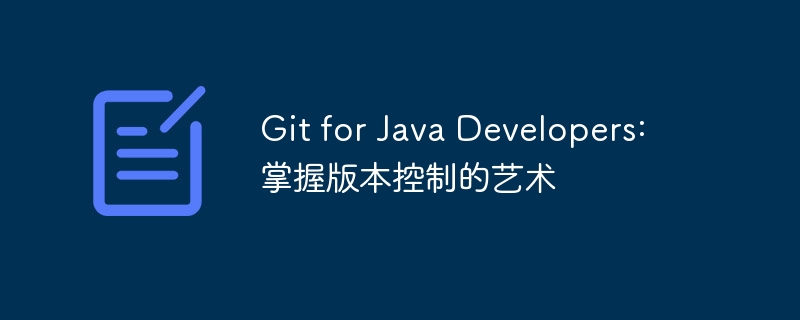
php editor Xigua has launched a new book "Git for Java Developers: Mastering the Art of Version Control", which provides Java developers with a comprehensive Git version control learning guide. This book uses concise and easy-to-understand language to introduce the basic concepts, common commands and advanced techniques of Git in a simple and easy-to-understand manner, helping readers quickly master the essence of version control. It is suitable for Java developers and readers interested in version control to help improve team collaboration efficiency and code management capabilities.
Git Basics
-
What is Git? Git is a distributed version control system, which means that every developer has a complete copy of the code base. This allows offline work and simplifies collaboration.
-
Repository: A code repository is a repository that stores code, history, and other metadata. It can be located on the local computer or on a remote server.
-
Versions: Git treats each snapshot of the codebase's state as a version. A version is identified by a unique identifier called a hash or commit ID.
Git workflow
-
Staging Changes: When changes are made to the code, these changes need to be staged so that they can be prepared before committing.
-
Committing Changes: Committing permanently saves staged changes to the code base. Commit messages describe the modifications made with the change.
-
Branching: Branching allows you to try new features or fix bugs without affecting the main code base.
-
Merging: Merging integrates changes from one branch to another. It can be used to merge new features into trunk or resolve conflicts.
Git in Java development
-
Integration with IDEs: Many Java IDEs such as IntelliJ idea and Eclipse provide seamless integration with Git, allowing developers to easily perform version control operations.
-
Maven and Gradle support: Build tools Maven and Gradle are integrated with Git, allowing developers to manage project dependencies and track code base changes.
-
Backporting and Cherry-picking: Git allows you to backport changes from one branch to another, or selectively pick changes from specific commits (called cherry-picking) .
Best Practices
-
Follow commit conventions: Using a standardized commit message format helps keep your codebase clean and readable.
-
Periodic pulls and pushes: Frequently synchronize with the remote code base to avoid conflicts and keep the code base up to date.
-
Use branches and tags: Branches and tags help organize your code and keep track of different versions of your project.
-
Enable code review: The code review process helps ensure code quality and promote team collaboration.
Git Tools
-
Git CLI: Git’s command line interface provides access to all Git functionality.
-
Github and Bitbucket: GitHub and Bitbucket are popular hosted Git repositories that allow teams to collaborate and share code.
-
GitLab: GitLab is a devops platform that in addition to Git version control, it provides other tools such as issue tracking and continuous integration.
benefit
By using Git effectively, Java developers can gain the following benefits:
- Collaboration and code sharing improvements
- Track code base changes and rollback errors
- Manage multiple code base versions
- Promote code reviews and best practices
- Improve development efficiency and productivity
The above is the detailed content of Git for Java Developers: Mastering the Art of Version Control. For more information, please follow other related articles on the PHP Chinese website!


 What are the java testing tools?
What are the java testing tools?
 How to open rar file
How to open rar file
 How to use Find function
How to use Find function
 What file is windows.old?
What file is windows.old?
 What is the difference between golang and python
What is the difference between golang and python
 What are artificial intelligence technologies?
What are artificial intelligence technologies?
 What should I do if I forget my broadband password?
What should I do if I forget my broadband password?
 location.search
location.search
 The difference between vscode and vs
The difference between vscode and vs




